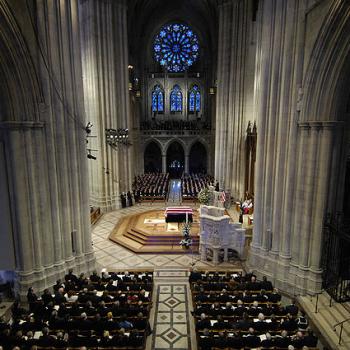Editors Note: This article is the first of a two part series. Read part two here.
Four years in the Bible Belt will teach even a thick-headed Catholic of Irish-Mexican descent a few things. It's here among the steeples jutting from little brick buildings and the megachurches that meet in converted warehouses that I came to realize how most southerners like their tea sweetened, their pork pulled, and their religious doctrine uncluttered.
The last of these preferences sometimes makes for awkwardness between evangelical Protestants and their Catholic neighbors. Anyone familiar with the demographics of the American South understands that Baptists and Presbyterians outnumber Catholics in this area. Fewer people have written about what it means to be a religious minority in a tolerant context.
If my own behavior as a Catholic whose children attend a nondenominational Christian school is anything to go by, some of us are cowards. We inadvertently feed the curiosity of non-Catholics by downplaying devotional practices that seem exotic below the Mason-Dixon Line, even when those practices are commonplace along the California Missions Trail and within majority Catholic populations elsewhere. As a result, the evangelical Christians with whom we interact may perceive a few differences between the Catholic vocabulary of faith and their own, but interdenominational friendships do not shed light on things like Eucharistic Adoration or the Stations of the Cross.
At the school my children attend, the Westminster Confession of Faith (A.D. 1646) trumps the Nicene Creed (A.D. 325). Not surprisingly, the preferred Bible translation contains only 66 books, and history teachers there applaud William Tyndale more than his sometime adversary, Thomas More.
Among parents who help chaperon annual class visits to a Civil War battlefield, I might be the only one who grew up hearing "Our Lady of the Highway, pray for us" whenever my mother backed out of parking spaces (Why Catholic devotion to the mother of Jesus ought not raise Protestant eyebrows is something I'll address in part two of this essay).
Times and locations have changed since my childhood. Rocky Balboa never had to explain the Sign of the Cross, and never had to shout "Yo, Adrian! What's a sacramental?" because the Italian Baptist community in Philadelphia has nothing like the cultural footprint enjoyed by the Italian Catholic community there. In the Carolinas, on the other hand, the most common way to start any prayer is with downcast eyes, and the ubiquity of that practice has slowed a reflex that once sent fingertips to my forehead, chest, and shoulders before all but the briefest of audiences with the King of Kings. Catholics sensitive to differences between Raleigh and Rome or Savannah and San Juan Capistrano notice these things.
Theology impacts prayer posture, too. Thanks to different interpretations of passages like the "Bread of Life" discourse in the gospel according to Saint John, Catholics kneel in church and Baptists do not. Yet the Catholics I know seldom talk with other Christians about the Holy Eucharist. Why be parochial when you can be ecumenical? All goes swimmingly until it dawns on some of us that there is a big difference between provoking people who worship the same God a little differently and piquing their interest to good effect.
Abetted sometimes by pastors who should know better, evangelical Christians often suppose that people like me pay too much attention to the pope. It is true that if something akin to the Richter scale measured the force of "Bible thumping," the Catholic Church would jiggle seismographs less energetically than some other Christian groups do. But whether that warrants repentance, reveals a church in thrall to "popery," or is merely the equivalent of the coaching advice that says when you put the football in the end zone, you should act like you've been there before-well, that's an open question.
The point is more easily seen if we transpose theology into musical terms, where the biggest problem facing "John Calvin and the Five Solas" is that members of that band never really understood that literacy is not a prerequisite for salvation. Martin Luther and the Reformers played the same gig under similar constraints. Both groups were, as Muslims seem to have noticed, "People of the Book."
Flannery O'Connor would know how to phrase the resulting dilemma, but she has gone to glory. Absent her verve, I can only suggest that the problem with "bibliolatry" is that Jesus himself is the source and summit of Christian faith. Provocative as it must sound to friends whom I loathe offending, when "sola scriptura" is the doctrine to which you hold fast, then perhaps Jesus, like Elvis, has left the building. But to their credit, my Protestant brethren have a knack for finding Jesus elsewhere, and strive to live the Beatitudes, also.




